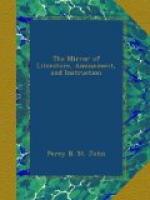“The servant whips the horse with all the strength of his arm. The generous animal, with the instinctive horror of his race for dead bodies, springs with redoubled speed from the spectacle of horror. The frightful trophy, and the cannibals that bore it, had been overturned in the mud—screams and imprecations pursued Albert, stretched senseless at the bottom of the cabriolet. The servant had kept the reins, and whipped the more fiercely, because he could perceive, from the motion of the carriage, that some one had got up behind it, and hoped that the rapidity of its progress would shake him off.”
“In a few minutes Albert reached our door—judge of our alarm!—pale, still quite senseless, not breathing. The moment the cabriolet stopped, the man behind jumped down, took my brother in his arms, as if he had been a child, and carried him into the house. It was Jaquemart. ‘The monsters,’ said he, ‘the monsters! the poor young man, they have killed him too.’ What could Jaquemart have been doing in such a garb, and among such a troop o’ ruffians?”
[1] And father of Madame Junot.
* * * * *
THE GATHERER.
* * * * *
The Paris correspondent of the Court Journal gives the following incident at the King’s Ball, about a fortnight since. I happened to be near his majesty when he addressed himself to an Englishman, wearing the Cross of Three Days. “Where did you signalize yourself, sir?” inquired the monarch. “At the Tuilleries, sire,” was the answer. “C’est aux braves de Juillet que je dois ma couronne,” said his majesty. The gentleman thus honoured was M. Bennis,[1] in whose literary establishment the king seems to take much interest.
* * * * *




